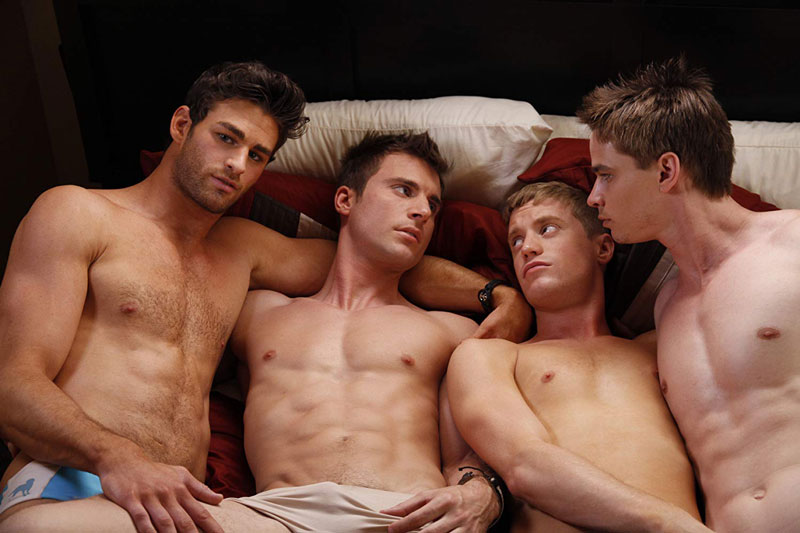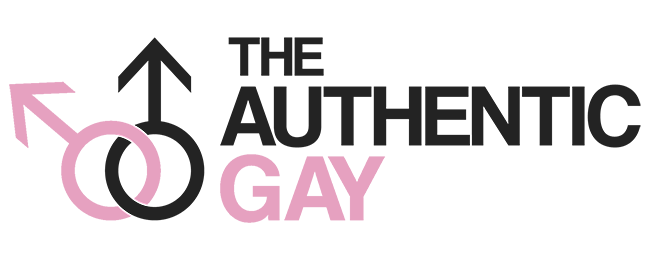How We Couple: Do We Need Multiple Partners Or Deeper Intimacy?

Whether you’re married with kids or living your best single life there’s no guidebook for gay coupling. Queer people are called urban pioneers because we discover new neighborhoods and moves places others would not. Similarly, we are on the bleeding edge creating our unique types of relationships. Sure, as queer men, it’s a privilege we can seek out as many sexual partners as we want. Yes, we can also establish romantic relationships that suit our specific sexual and emotional needs. And yet, we often run into just as many issues with these relationships whether they are monogamous, polyamorous, or casual. Is this sexual freedom coming at the expense of developing deeper emotional intimacy? Or is it helping? Can we be monogamous or is that just heteronormative programming? Or is it the monogamy vs. non-monogamy debate that’s really tripping us up?
There is more than just monogamy and nonmonogamy. Monogamy means just the one partner and the kitchen’s closed. That doesn’t mean there isn’t any heat. With non-monogamy, there’s a ton of options for relationships. There’s emotional monogamy where you have sex with different partners but maintain one romantic relationship. There’s polyamory where you have multiple romantic partners. There are throuples and triads where you have three equal partners. Each non-monogamous relationship has its own rules. Only you and your relationship partners can decide what is good for you. But the question is, what is serving your highest good?
It seems like many queer people think non-monogamy is the only way to be. Sex columnist Dan Savage is widely outspoken against monogamy. In one video he calls monogamy “ridiculous.” He elaborates, “men were not monogamous for all of human history.” Heteronormative culture does force-feed us the romantic comedy narrative of “the one.” But there are 100% monogamous couples out there. Seeing monogamous relationships that work can be really inspiring…even for the most jaded heart. While we should acknowledge monogamous relationships don’t work for everyone. We shouldn’t discount them as a choice.
No relationship is perfect. Many non-monogamous relationships are smokescreens for codependency, addiction, and intimacy issues. Similarly, monogamous relationships can be smokescreens for…codependency, addiction and intimacy issues. A relationship, at its core, is two, or more people committed to spending time together and establishing a place in each other’s lives. As queer people, our view of relationships can be clouded by bad relationship models, abuse or neglect from loved ones, and even just the alienation of being LGBTQ. This can cause barriers to intimacy and lasting relationships.
If your dad threw you out when you came out you may have daddy issues (link to Daddy Issues article). You may have intimacy issues from abuse or sexual trauma that keep you from connecting. You may have two parents who are still together in a loving committed monogamous relationship and that’s what you want. So much of the conversation boils down to monogamy vs. non-monogamy. And like any ideological difference in our country, it becomes two opposites rather than a collective dialogue. You get people who are militantly non-monogamous and judge people for wanting a single partner. You also get people who are so tied to monogamy that they create these stringent heteronormative dating expectations and shame people who deviate.
Team Monogamy
It’s the industry standard. We’re fed romance propaganda of “the one.” But there is something major you gain from monogamous relationships. The stability you get from one partner can help you build a stable home life together. Over time, the ability to compromise and be completely intimate with someone can help you to be your most authentic self all of the time. Having someone who knows you over time and intimately can give you the perfect person to call you out on your B.S. with love. There’s a certain intimacy that can only develop over time and hundreds of partners can not replace that. What you learn in one committed relationship can teach you more about who you are as a person.
Sexually, monogamy is healthy. We may have Truvada/Prep but epidemiologically, we’re not that far off from the wild barebacking ways of the 1970s. And were a fungal or bacterial infection to mutate or shock our medical system we would be ill-prepared.
Also, monogamy, while heteronormative, does work for many people. Oftentimes, sexual restraint can allow us to focus on other aspects of our life and our partnership. We can learn where we might be other-focused rather than self-focused. We can learn to establish proper boundaries and end toxic patterns in our social, platonic and work lives. Even if one were to consider non-monogamy, starting a relationship with an extended period of monogamy is a good idea.
The Problems with Monogamy
Socially proscribed monogamy can force us into relationships before we are ready. The idea of “the one” can put pressure on us when dating to try and make this one person be everything. This explains the Grindr profiles that sound like wish lists for Santa. One person can not be all we want and need in one fixed moment in time. We are still growing.
Monogamy can often rush a commitment to appease social mores rather than deeper emotional, sexual, and romantic wants and needs. The idea of “the one” can make people force a romantic connection to try and “get a boyfriend.” Relationships are not status symbols, emotional or therapeutic cure-alls, or a good way to save money on rent. Well, maybe that last one. They take time to build one brick at a time.
Relationships should happen organically. They should happen over time out of a mutual affinity, affection, and respect not out of some heteronormative idea of dating. Sorry, y’all this is not Sex and the City. Even monogamous relationships can happen after a period of being causal or open. It’s a popular misnomer that a relationship is two halves making a whole. Actually, it’s two complete people deciding that they want to be together.
Some people luck out and find a relationship that not just suits them but grows with them. That’s great. But we should not just force ourselves to make it work. Some life lessons can only be learned by having our hearts broken or dating someone who shows us our barriers to relationships so we can do the work, on our own, and find someone right for us.
Team Non-Monogamy

Non-monogamy can allow you to prioritize yourself and your wants and needs.
The Ethical Slut by Dossie Easton and Janet Hardy has become the unofficial guidebook for polyamory. It’s given people a dialogue to explore multiple relationships and or how to set terms and negotiate boundaries with your various romantic partners. By attacking the typical, conservative norm non-monogamy can get tied into other subcultures like BDSM or geekdom. This can be a double win and help you find your tribe.
Jamila Dawson, LMFT, Sex and Relationship Therapist says, “There’s a lot of misconceptions about polyamory and/or ethical non-monogamy. One of the big ones is that people are poly because they can’t commit.” There are some people in open relationships because they cannot commit. But arguably they are either not being ethical in their non-monogamy or using their open relationship to deflect their issues.” Dawson goes on to say, “One of the main understandings of polyamory is that it’s about transparently maintaining intimacy (whether sexual, romantic, platonic) with more than one person, not treating people like things or as though they’re replaceable.”
More love doesn’t sound like a bad thing. Polyamory can allow for reparative relationships. Queer people can have trouble connecting from trauma, homophobia, abandonment or abuse. But having a relationship on your terms can help you reassess how you view love and intimacy. Also, the boundaries, awareness, and challenges you learn from your relationships can help you with your shortcomings and with forming lasting bonds. If you can only take in 20% of the love you’re given you may need multiple sources to learn what 100% feels like. Or if you give too much multiple partners can show you exactly how much you are giving away vs. what you are giving to yourself.
One barrier to non-monogamy is jealousy. But jealousy is an attempt to own someone rather than being equal partners. It’s also a sign of someone’s internal issues and a lack of trust and security in the relationship. Even monogamous relationships can thrive after a time being open. Learning to curb your jealousy can help you in having a more realistic understanding of healthy relationships and building a trusting open dialogue with your partner.
The Problems with Non-Monogamy
Non-monogamy can sometimes be about getting what you want versus what you need. What if you have four different partners in an attempt to get what you want from one person. Having multiple partners can keep you from working out what you need to do to be fully open. While dating multiple people can be great it is not always sustainable. It can end up being more work than a single relationship.
Dating multiple people can be a resistance to commitment, a holdover of a lack of stability in your past or even undiagnosed sex or love addiction. Bear in mind, that is not the ethical non-monogamy outlined in The Ethical Slut. We’ve all met that couple in an open relationship who are thirstier than their single friends. Dawson goes on to point out, “Ethical non-monogamy isn’t a fix for a wounded person or a broken relationship. But just as with monogamous relationships, the quality of the relationship is a direct reflection of the people involved. Just as people use monogamy to fill a void, hide from personal development, or cheat, people do the same in polyamory.” If you are super thirsty in any relationship it’s likely about something other than sex and only you can do the work to solve that issue.
The thing about relationships is that there is no one “right” relationship. They happen best organically. There are gays that are monogamous, gays in multiple polyamorous relationships, guys who are together but allow each other to sleep around and asexual aromantic gays happily alone. What makes a relationship work is first a healthy relationship with yourself. Next, it’s about a mutual affinity and respect for each other that allows everyone to be themselves and honor their wants and needs.
It’s been said that relationships with the right person should be easy. It’s also said that relationships take work. That can seem like two conflicting ideas. And yet, they make sense. Spending time with someone you are in a relationship with should be easy. Being able to be yourself around someone you love should be easy. Certain things like intimacy, communication, and chemistry should be easy. But staying together, compromising and making things last over time takes work. But it’s a choice. So ultimately it’s best to focus less on what society or queer culture deems as “right” and search for your right with the right one.
Christian Cintron is a writer, actor, and stand-up comedian. He has written about entertainment and gay culture for Edge Publications, Queerty and DNA Magazine. He’s also a regular contributor to Backstage.com.
YouTube: CintronicComedy // Twitter: AbsoluteCintron // Instagram: @SighKickScream
